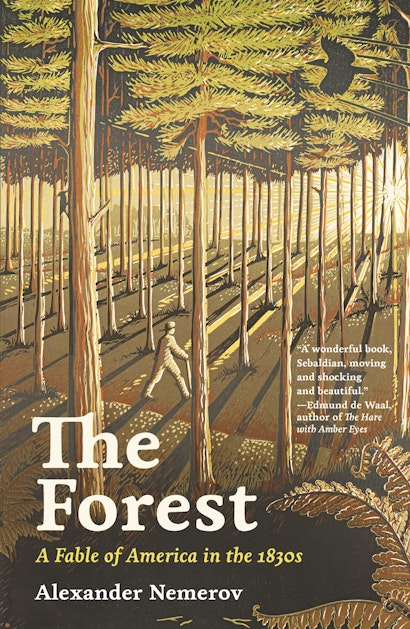Sitting before a lake one summer, Nathaniel Hawthorne took a newspaper from his pocket and began to read. His object was not to catch up on the news but to play a trick—to lull nature into a false sense of security, to make it think he was not perceiving the world around him, so he could look up suddenly and see the trees for how they really are.
“The best way to get a vivid impression and feeling of a landscape,” he explained, “is to sit down before it and read, or become otherwise absorbed in thought. For then, when your eyes happen to be attracted to the landscape, you seem to catch Nature at unawares, and see her before she has time to change her aspect.”
“The effect lasts but for a single instant,” he continues, “and passes away almost as soon as you are conscious of it, but it is real for that moment.” And in that instant, the effect is magical: “It is as if you could overhear and understand what the trees are whispering to one another.”
I had these thoughts in mind when I wrote about America in the 1830s. Who among people then sought to experience the world as it is? I found some characters who did—some of them actual historical figures, others I invented. And trees—fractal, simple trees, chopped down by the acre in that decade—became for me a setting and subject, the disappearing center of a human dream.
Hawthorne taught me something else. Reading gets a person only so far. It gets them only to the verge. In my case, reading alone would not allow me to envision what I came to see. I study to experience what cannot be studied: to glimpse the phenomenon, the event, the past, whatever it is.
Following Hawthorne some more, I perceived that research is only a ruse—a trick to distract the world I wish to see. If that world were to perceive that a writer wishes merely to “research” it into being, some fateful clue would elude even a Sherlock Holmes of detection. Research is a feint rather than a means of revelation, and studying is a necessity but not in the way scholars think. It is really a prelude, an evasion, an offering—a ritual obeisance to a powerful force—that positions us to put down our papers and behold what the affairs of the day cannot say.
But if no paper was going to show me what I wanted to see, how then could I describe a world that defies words? For answer I sought not the muse but her overlooked sister, that seamstress of the abyss I call “the gap.”
The gap rules the emptiness between us and the world. Despite its poverty of being, it has plenty of luxury and allure. It is made of thin air, but it hovers in the vicinity of Hawthorne’s encounter with the real, providing his energy, his reason to be.
That is because emptiness is the stuff of desire, of longing—a wish to reach out, to go beyond where we stand. Just where the air is purest, where the light is most translucent, I come to think that nothing intrudes between me and the world I see. But at the same time I sense that the immediacy is actually thick—thick because it is made of the desire, my own, that sets me going from here to there.
In the thrall of that sense, a lost world goes from being merely inaccessible to being hidden. There is a big difference. Hidden worlds are near. They are approachable. They are, I might say, curious about the person who is game enough to employ tricks of the trade to conceal his desire sufficiently enough to make these strange denizens of another time drop their guard and be as they are. To give that hidden world its proper due of agency (for don’t our topics write us, and not the other way around?), the trees might even be charmed by such a supplicant and his duplicitous craft. Knowing they will be tricked, they allow his approach, grant him an audience. The gap intervenes, and the leap is all.
The world is lifeless to the willful glance.
Alexander Nemerov is the Carl and Marilynn Thoma Provostial Professor in the Arts and Humanities at Stanford University. His many books include Fierce Poise: Helen Frankenthaler and 1950s New York and Soulmaker: The Times of Lewis Hine (Princeton).

